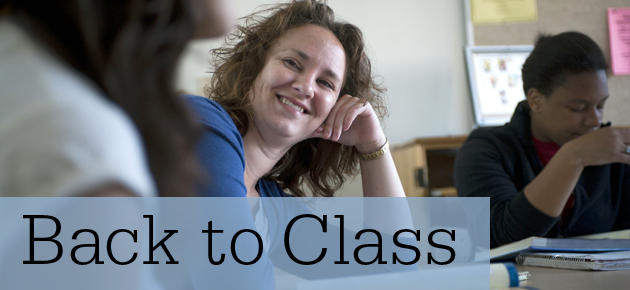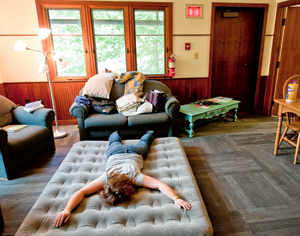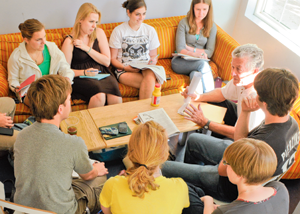
by Molly Willow '00, photographs by Davis Turner
I'm sitting in an introductory French class just after 9:00 a.m. on a fall Monday when I realize I'm not wearing deodorant. The class of nearly twenty students is following Professor Mort Guiney as he energetically goes through the day's lesson. He asks students how they are doing (everybody nails "bien") before moving on to harder textbook stuff, such as what day Marcel has history class.
The students have had only three weeks of college French, so there are a lot of guesses. But I graduated from Kenyon in 2000 as a double major in English and Modern Languages and Literatures, focusing on French and Spanish. I spent my junior year in Paris and completed honors in French. Guiney was my advisor. So I'm a little surprised that when he calls on me, I break out in a panicky flop sweat, realizing not only have I forgotten to put on deodorant, I have also completely forgotten the French word for "Thursday."
Merde.

In mid-September, I went back to college. I wondered if Kenyon would seem different, if I would seem different. I wanted to re-experience learning about fascinating subjects without worrying about their workplace application. What would the Kenyon bubble feel like after a decade out there, where the real world reminds you daily that college is the last time you're on equal footing with your peers? (It's not who you know to get into a class.) And so, over the course of a few days, I attended classes, stayed overnight in student housing, and even got a new Kenyon hoodie—you know, to blend.
Répétez, s'il vous plaît
The highlight of my first French class in ten years comes when Professor Guiney asks me what I'm doing this morning and I manage to correctly reply "studying." The students are not impressed; this is one of the few verbs they know. When he asks them what they're up to later, they're not allowed to say sleeping or doing laundry, because they don't know the vocab yet.
A spindly boy in a striped shirt with glasses so big and round they look like they came from an Eighties thrift shop cannot get an answer right to save his life. Not only does he not know the words, his French accent ... well, let's just say that Pepe Le Pew has better inflection. But Professor Guiney does not let him off the hook, sticking with him as he repeats a sentence, eliminating errors at each pass. At the right answer Guiney erupts in a cheer. "Bon! D'accord! Très bien! Oui!" His praise is so extravagant, the students break out in smiles all around.
"At Kenyon, you have fans. There are people rooting for you, offering encouragement and guidance. Kenyon just might be the last time in your life when you are surrounded by people who are actively trying to help you become a better version of yourself."
My Wednesday intro Spanish class serves up a similar scene. Professor Clara Román-Odio also uses exuberant encouragement to maintain students' enthusiasm and interest, greeting woefully wrong answers with her throaty laugh that excuses all. Neither she nor Guiney settles for "close enough." Both appear confident, even with seemingly insurmountable evidence to the contrary, that students can come up with the right answer. I find the positive reinforcement almost overwhelming and am a little embarrassed at how jealous I am of the students on the receiving end. Before my return to Guiney's class, I look up "Thursday" (jeudi) and am seriously hoping to be called on again to redeem myself.
The idea of going back to college was instantly appealing, but it's not until I'm sitting in class that I realize why: at Kenyon, you have fans. There are people rooting for you, offering encouragement and guidance. Kenyon just might be the last time in your life when you are surrounded by people who are actively trying to help you become a better version of yourself.
The Bard and the bubble
My next class is Shakespeare with Professor Sergei Lobanov-Rostovsky, whom students call "Sergei" for obvious reasons. They're reading A Midsummer Night's Dream, which I remember as a cheerful romp. But no, it turns out to be grappling with the role of love in marriage and a woman's place in a relationship—heady stuff, given that all I recall is that a dude gets turned into an ass.
Someone effortlessly uses the phrase "singular dichotomy" in their commentary, which I struggle to follow. If a student spits out a half-formed idea, Sergei asks guiding questions. I can actually see him making them think. "You seem to be suggesting..." he responds to one student who, upon hearing her unfocused thoughts about the role of love in marriage reconstituted by the erudite professor, agrees that yes, that's exactly what she meant. In my head, I contrast this scene to the world outside the bubble. When was the last time you sat in a staff meeting and the boss took your nugget of an idea and spun it into gold, then gave you credit for it?
I'll admit, I always thought I was one of the better students in the classes I took with Sergei. I'm now willing to bet that, thanks to him, everyone else thought they were, too.
Sergei compares the fantasy-like woods of the play's dream to Kenyon. At first I think he might be gently mocking the students, reminding them of their privileged bubble, but, of course, he's exactly right. In this place apart, up on the Hill, with its own rules and social norms, Kenyon is an alternate world where people are free to express their true selves, fall in love, and, sometimes, turn into asses.
News and reviews

After class, I head to the Middle Ground café to join in on the weekly staff meeting for The Collegian. Writer-in-residence P.F. (Fred) Kluge '64 was the paper advisor in my day, as now. In his own way, he, too, roots for the students; it's just crankier fanfare.
Kluge leads the article-by-article review of that week's newspaper, calling the issue "solid" but "unsurprising." He tells one reporter to have fun with an upcoming assignment and arrows his gaze at the unlucky student who oversaw the headline "Football's Defense Faulters in Overtime." "Which of you liberal arts students doesn't know how to spell falters?" he asks, as the guilty party raises his hand sheepishly.
Next it's time for the staff to pitch their stories. "What do you guys have? Please excite me," Kluge commands. There's a job search to cover, which does nothing for him, and a follow-up on the Harcourt Parish rummage sale. Kluge urges the young woman to get creative with it and, rather than moping about a ho-hum assignment, she seems to like the challenge. One reporter pitches his rumor-based story with urgency and mentions he thinks he has a source, but he doesn't elaborate. He races off early, saying he has an interview scheduled. It's easy to picture him some day working at a daily, hoping to be called "Scoop."
This staff meeting is my first for the Collegian, despite my having written for it as a student. A spoiled columnist, I had the privilege of writing from my dorm, and while abroad from France, never having to hear in a group setting what Kluge thought of my weekly musings. But of course, he let me know that one of my first-ever columns about the poor quality of the food was hardly original. He probably called it "unsurprising."
During the brisk gathering, I realize I'm back where I started. I graduated with no specific career plans, just hoping to make a living writing. I ended up at a weekly newspaper, then another, eventually working my way up to television critic at the Columbus Dispatch, a pretty plum gig, all things considered. Then in 2009, I was laid off, effectively killing any desire I ever had to work at a newspaper. And now I'm back at Kenyon, still trying to make a living out of writing, a walking cautionary tale against journalism.
I don't mention any of this at the staff meeting. I don't want to burst the bubble.
That evening I'm off to more quality Kluge time, as he leads his intro to fiction-writing class. He's still using the same book of short stories and he still manages to make writing seem mysterious, sexy, and tortured. He talks about bad story endings ("And then I woke up" is a classic no-no) and urges the students: "Don't make these mistakes. Make more original mistakes."
He lets me go at the halfway point, before the students discuss their work. Probably just as well, since I can't help but envision a scenario in which someone asks me my credentials and I have to 'fess up to being a freelance writer, which sounds an awful lot like "unemployed." But Kluge's crusty air of mystery still inspires. I want to go home and finish writing my novel.
The take-away
Over the next few days, as I continue stumbling through lessons in three languages, I find myself wondering more than once what each class will be studying the next week. I want to go back for more of Jon Tazewell's "Acting for the Screen" class, and get up on the stage, even with no intention of ever doing so out in the real world. I want someone to explain more Shakespeare to me.
What I most miss about college was the sense of unlimited possibility, of not knowing what the future would hold. Kenyon affords the luxury of ignorance of what will come. Sometimes I wish Kenyon had better prepared me for the harsh realities of the real world, but most of the time I'm glad I had my too-short time in the bubble.
On my third and final day on campus, with my last class over and nowhere to be, I head for the hill behind Old Kenyon and, using my new Kenyon sweatshirt as a pillow, I lie down for a nap in the warm fall sun. Eventually, I think as I drift off, I have to wake up.

 Delicious
Delicious Facebook
Facebook StumbleUpon
StumbleUpon Digg
Digg reddit
reddit